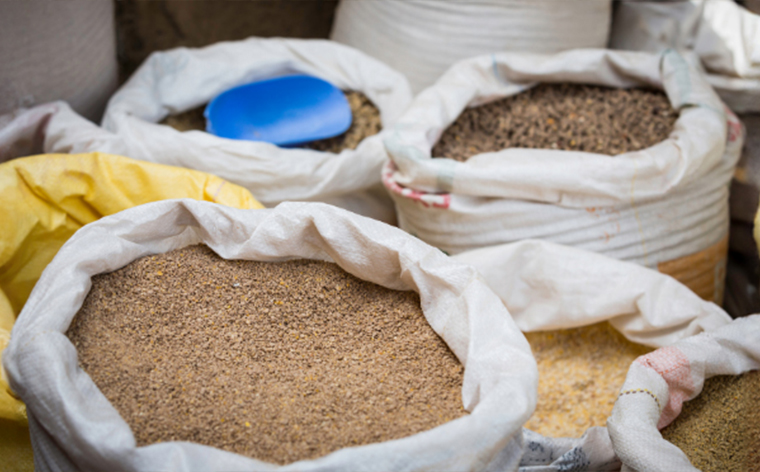Introduction
Farmers face a big challenge when it comes to storing their grain. Keeping it safe from moisture, pests, and spoilage isn’t easy, especially when using older methods like silos, which can be expensive and less flexible. This is where grain bags come into play as an intelligent solution.
Grain bags are long, sturdy bags that store large amounts of grain in the field. They offer a simple and cost-effective way to keep grain safe and fresh. Farmers can avoid the high costs of traditional storage by using these bags and still protect their harvest from the elements and pests. This makes grain bags an excellent choice for farmers looking for a reliable and efficient storage solution.
What are Grain Bags?
Grain bags are essential tools for anyone in the farming industry. They serve a simple yet vital role: storing and transporting grains safely from farms to markets or storage facilities. These bags ensure that grains like wheat, rice, and corn are kept in good condition, protecting them from moisture, pests, and other environmental factors that could harm their quality.
In agriculture, the use of grain bags is widespread because they are reliable and easy to handle. This makes the process of shipping grains over long distances much smoother and less worrisome for farmers and distributors.
There are mainly two types of grain bags used today: PP woven bags and BOPP bags. PP woven bags are made from polypropylene fabric, which is strong and durable. It’s a material that doesn’t tear easily, making these bags great for heavy loads. BOPP bags, or biaxially oriented polypropylene bags, are similar but have an additional layer that makes them even stronger and gives them a clearer surface that can be printed on. This is especially useful for brands that want their bags to look nice and carry their logo clearly.
Both types of bags are designed to meet the needs of modern agriculture, providing effective solutions for storing and transporting grain safely and efficiently. By using these bags, farmers can ensure that their grains reach their destination in the best possible condition, maintaining quality from the field to the consumer.
Benefits of Using Grain Bags
- Cost-Effectiveness: Grain bags are more affordable than traditional storage methods like silos. They require less investment upfront, making them a budget-friendly option for farmers.
- Flexibility: These bags offer great flexibility regarding storage volume and location. Farmers can adjust the amount of grain they store and choose different locations on their farm to place the bags, adapting easily to their annual harvest needs.
- Quality Preservation: Grain bags effectively protect grain from moisture and pests. This protection helps maintain the grain’s quality over time, ensuring it remains dry and safe from common threats that can degrade its value.
PP Woven Grain Bags
Polypropylene, commonly known as PP, is a type of plastic widely used in making various products, including grain bags. It is favored for its strong and flexible qualities. PP material is light yet sturdy, which means it can hold a lot of weight without breaking. This makes it an excellent choice for creating bags that need to carry heavy loads like grains.
Benefits of using PP woven bags for grain storage
- Durability and Resistance to Tearing: PP woven bags are tough. They don’t tear easily, even when they are packed full or handled roughly during transport. This strength is crucial for farmers who need their grain bags to withstand the journey from farm to market or storage without splitting open.
- Moisture Resistance Capabilities: Keeping moisture out is vital when storing grains, as excess moisture can lead to mold and spoilage. PP woven bags help protect their contents from moisture, ensuring that grains stay dry and safe during storage and transportation.
- Cost-effectiveness and Recyclability: One of the biggest advantages of PP woven bags is their affordability. They offer excellent value for money because they can be produced at a low cost and used multiple times. Plus, they are recyclable, which means they can be turned into new products at the end of their life cycle, reducing waste and helping the environment.
- Common Uses in Agriculture: In the agriculture industry, PP woven bags are used not just for storing grains but also for packing other agricultural products like seeds, feeds, and fertilizers. Their versatility and strength make them suitable for various uses, making them a staple in agricultural operations.
Overall, PP woven bags are a reliable choice for farmers and distributors who need sturdy, moisture-resistant, and cost-effective packaging solutions for their grains. Their use helps ensure that agricultural products are kept in optimal condition throughout their handling and storage.
BOPP Grain Bags
Biaxially Oriented Polypropylene, or BOPP, is a special kind of material used in making grain bags. This material is treated under specific conditions that stretch it in two directions. This process makes BOPP exceptionally strong and clear, which is why it’s used for packaging that needs to be both tough and visually appealing.
Benefits of using BOPP bags for grain storage
- Superior Strength and Puncture Resistance: BOPP bags are very strong. They resist tears and punctures better than many other types of bags. This means they can handle rough treatment during transport and handling without getting damaged. For farmers and distributors, this reduces the risk of losing grains due to bag failures.
- Enhanced Graphic Capabilities for Better Branding and Visibility: One of the standout features of BOPP bags is their glossy finish and clarity. This allows for high-quality printing on the bags, which makes logos, labels, and other information look more vibrant and attractive. For businesses, this means better branding opportunities and easier identification of products during shipping and in markets.
- Improved Barrier Properties Against Moisture and Pests: BOPP bags are excellent at keeping out moisture and pests, which are two major threats to stored grains. Their barrier properties help maintain the quality and freshness of the grains, ensuring that they reach the consumer in the best possible condition.

Choosing Between PP Woven and BOPP Bags
When it comes to selecting the right type of grain bag, farmers and distributors often choose between PP woven and BOPP bags. Each type has its own set of benefits and costs, making them suitable for different needs. Here’s a closer look to help you decide which bag is best for your specific requirements.
Cost Implications
- PP Woven Bags are generally less expensive to produce than BOPP bags. This makes them a cost-effective option for many farmers who need sturdy and reliable packaging without a high price tag.
- BOPP Bags, while more costly, offer advanced features such as better print quality and increased durability. This might be a worthwhile investment for businesses focusing on brand visibility and long-term storage.
Suitability for Different Environmental Conditions
- PP Woven Bags perform well in a variety of environments. They are robust, making them good for rough handling and external storage conditions. However, they might not offer as much protection against moisture as BOPP bags.
- BOPP Bags have excellent barrier properties that protect against moisture and pests, making them ideal for environments where these factors are a concern.
Longevity and Reuse Potential
- PP Woven Bags are designed to be durable and can be reused several times, which adds to their value, especially in cost-sensitive operations.
- BOPP Bags also offer longevity but their reuse potential is influenced by their initial condition after use. They are best used where long-term storage is required, and the bags will not be frequently moved or opened.
Tips on Selecting the Right Type of Grain Bag
- Assess Your Needs: Consider what is most important for your operation—cost, durability, or branding.
- Consider Environmental Factors: Choose a bag type that can withstand the conditions under which it will be used, whether it’s humidity, pests, or rough handling.
- Think About Long-Term Savings: While BOPP bags may cost more upfront, their durability and excellent protective features could save money on lost product due to spoilage or damage.
- Sample Both Types: If possible, test both PP woven and BOPP bags with your products to see which type performs best in real-world conditions.
Choosing the right grain bag is essential for maintaining the quality and safety of your agricultural products. By understanding the differences between PP woven and BOPP bags, you can make an informed decision that suits your specific needs and helps keep your grains secure from farm to market.
Challenges and Considerations
Grain bags are a great way to store grain, but like any method, they have challenges. Here are some common ones and tips on how to deal with them effectively.
Common Challenges
- Damage from Wildlife and Weather: Animals can puncture grain bags, and harsh weather can tear them. This exposes the grain to moisture and pests.
- Proper Sealing: If grain bags are not sealed well, air and moisture can get in, spoiling the grain.
- Placement Issues: Choosing the wrong location to place grain bags can lead to problems like water pooling around the bags.
Tips for Maximizing Effectiveness
- Careful Placement: Always place grain bags on a clean, dry, flat surface. Make sure the area doesn’t collect water and is away from wildlife.
- Regular Checks: Inspect your grain bags regularly for signs of damage or wear. Early detection allows you to fix issues before they cause major losses.
- Proper Filling and Sealing: Fill bags evenly and seal them tightly to keep out air and moisture. This helps maintain the quality of the grain.
- Use Quality Bags: Invest in high-quality grain bags resistant to UV light and tearing. Better quality bags last longer and offer better protection.
By understanding these challenges and following these tips, you can make the most of using grain bags for grain storage.
Anita Plastics, a leading manufacturer of polypropylene fabric in the US, specializes in producing high-quality grain bags, BOPP bags, and woven polypropylene bags. With a commitment to innovation and quality, Anita Plastics provides reliable and effective storage solutions that meet the diverse needs of modern agriculture. Their products are designed to offer maximum protection and durability, helping farmers safeguard their harvests efficiently and cost-effectively.
Conclusion
Grain bags offer a flexible, cost-effective solution for storing grain, making them an excellent choice for many farmers. They provide reliable protection against moisture and pests while being easier and cheaper to set up compared to traditional silos and barns. Though there are challenges, such as potential damage from wildlife and the need for careful placement and sealing, these can be managed with regular checks and proper handling. By using high-quality bags and following best practices, farmers can ensure their grain stays safe and fresh.
In addition to grain bags, BOPP bags and woven polypropylene bags are top choices for grain storage, offering superior durability and protection. Anita Plastics, a reputable polypropylene fabric manufacturer in the US, supplies high-quality storage solutions that cater to the modern agricultural industry’s needs. Grain bags represent a modern, practical approach to grain storage, meeting the needs of today’s agricultural industry.




